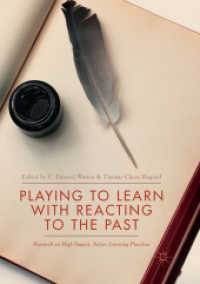Full Description
International lawyers have long recognised the importance of interpretation to their academic discipline and professional practice. As new insights on interpretation abound in other fields, international law and international lawyers have largely remained wedded to a rule-based approach, focusing almost exclusively on the Vienna Convention on the Law of Treaties. Such an approach neglects interpretation as a distinct and broader field of theoretical inquiry.
Interpretation in International Law brings international legal scholars together to engage in sustained reflection on the theme of interpretation. The book is creatively structured around the metaphor of the game, which captures and illuminates the constituent elements of an act of interpretation. The object of the game of interpretation is to persuade the audience that one's interpretation of the law is correct. The rules of play are known and complied with by the players, even though much is left to their skills and strategies. There is also a meta-discourse about the game of interpretation - 'playing the game of game-playing' - which involves consideration of the nature of the game, its underlying stakes, and who gets to decide by what rules one should play.
Through a series of diverse contributions, Interpretation in International Law reveals interpretation as an inescapable feature of all areas of international law. It will be of interest and utility to all international lawyers whose work touches upon theoretical or practical aspects of interpretation.
Contents
Preface by James Crawford Introduction
1: Daniel Peat and Matthew Windsor: Playing the Game of Interpretation: On Meaning and Metaphor in International Law
2: Andrea Bianchi: The Game of Interpretation in International Law: The Players, The Cards, and why the Game is Worth the Candle
The Object
3: Iain Scobbie: Rhetoric, Persuasion, and the Object of Interpretation in International Law
4: Duncan B Hollis: The Existential Function of Interpretation in International Law
5: Jean d'Aspremont: The Multidimensional Process of Interpretation: Content-Determination and Law-Ascertainment Distinguished
The Players
6: Andraz Zidar: Interpretation and the International Legal Profession: Between Duty and Aspiration
7: Michael Waibel: Interpretive Communities in International Law
8: Gleider Hernández: Interpretative Authority and the International Judiciary
The Rules
9: Eirik Bjorge: The Vienna Rules, Evolutionary Interpretation, and the Intentions of the Parties
10: Julian Arato: Accounting for Difference in Treaty Interpreation Over Time
11: Anne-Marie Carstens: Interpreting Transplanted Treaty Rules
The Strategies
12: Fuad Zarbiyev: A Genealogy of Textualism in Treaty Interpretation
13: Harlan Grant Cohen: Theorizing Precedent in International Law
14: René Provost: Interpretation in International Law as a Transcultural Project
Playing the Game of Game-Playing
15: Jens Olesen: Towards a Politics of Hermeneutics
16: Martin Wählisch: Cognitive Frames of Interpretation in International Law
17: Ingo Venzke: Is Interpretation in International Law a Game?
Conclusion
18: Philip Allott: Interpretation- an Exact Art








